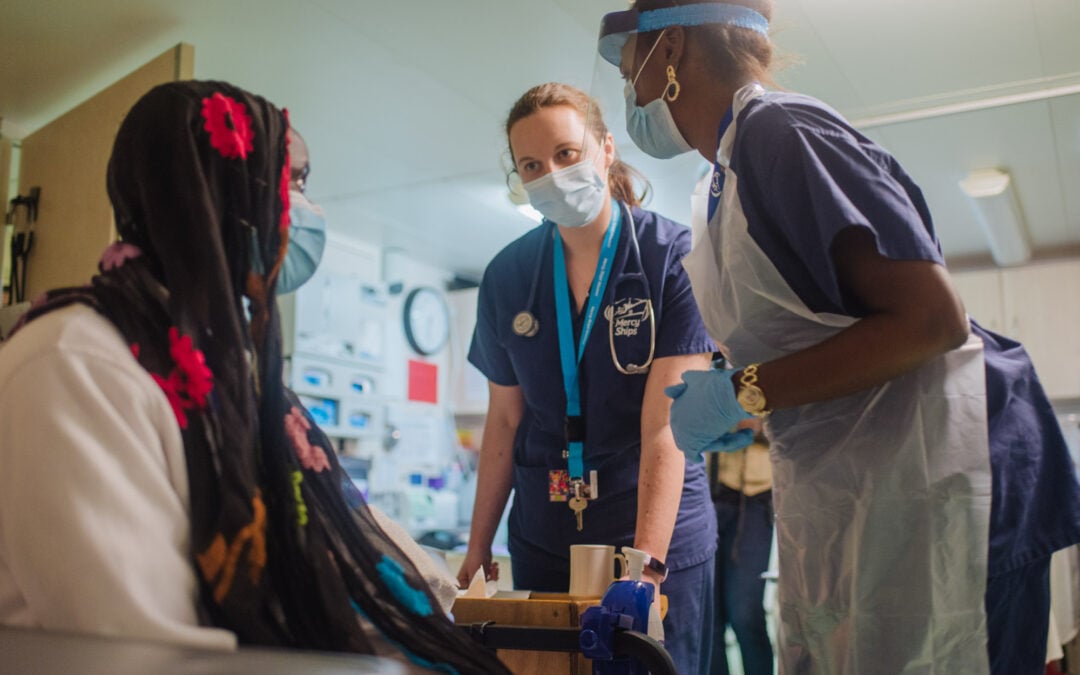Anchored in the port of Dakar, Senegal, the Africa Mercy® and her crew are reuniting with their mission to bring hope and healing.
After years of preparation during the COVID-19 pandemic, the volunteers on board could not be more ready to welcome patients back on board the ship for safe and free surgery.
“This is what the last two years’ worth of work has been working toward,” said Pete Savage, the COVID Readiness Facilitator on board. “This moment.”
The excitement is building, but with the excitement comes a weighty responsibility. Pete and fellow volunteer Keren Fuhrmeister, the Hospital Director for the Africa Mercy, are two of the people working every day to make the floating hospital safe for surgery during a global pandemic. This starts at the first point of contact with patients.
“We’ve had to look through everything right from the time that we select them all the way through to the time they’re discharged back home, and then look at how their risk can be minimised the whole way through,” Keren said.
Patients are given an opportunity to be vaccinated against COVID when they’re selected, but it’s not a requirement. Then, every patient is tested before being transported to the Mercy Ships Hospital Outpatient Extension (HOPE) Centre, where they’re quarantined for 10 days.
In the hospital, patients will be provided with masks, and every patient-facing medical volunteer will wear one. During close interactions, volunteers will wear more protective equipment like gloves and aprons.
The total number of surgeries is limited to about 950, due to decreased capacity in the ship’s wards.
All crew and day crew members have been vaccinated against COVID, and shore leave is limited, to guard against the possibility of an outbreak on the ship.
Perhaps the most difficult change of all has been separating non-medical crew from the hospital. This means that while volunteers will still have opportunities to interact with patients, they won’t be able to visit and build friendships with patients down in the wards in the same ways they normally would.
“We’re trying to make sure that people understand the mission comes first,” said Keren.
All of these guidelines are developed by a group of doctors and other crew leaders. They meet on a regular basis, going through the latest research from all over the world. Keren and Pete said one piece of evidence in particular is guiding their decisions.
“People that have COVID, when they go into surgery, are at a substantially higher risk than if they didn’t,” said Keren. “That’s why we’re trying to protect them.”
The research shows those people have worse outcomes, take longer to rehabilitate, and spend more time in the wards, Pete said.
“We’re all here for the patients, whether you’re in the galley, whether you’re an electrician downstairs,” Pete said. “Ultimately we’re all there for that surgery to happen, so protecting the patients from COVID is the key.”
Despite these limitations, Pete and Keren both know that coming face to face with the work of the hospital is deeply impactful for the volunteers serving on board. That’s why they’re coming up with creative ways to keep the crew connected.
They’re exploring the possibility of virtual hospital tours, and a “patient of the week” whose story could be shared with the crew, inviting them to learn about the process of surgery and rehabilitation.
“Every person on board is valuable and required, and whether or not you see a patient doesn’t mean the impact is any less than what it was before,” Fuhrmeister said.
With these thoughtful COVID protocols in place, Mercy Ships is thrilled to have welcomed the very first patients into the floating hospital and starting long-awaited surgeries once more!

Recent Comments